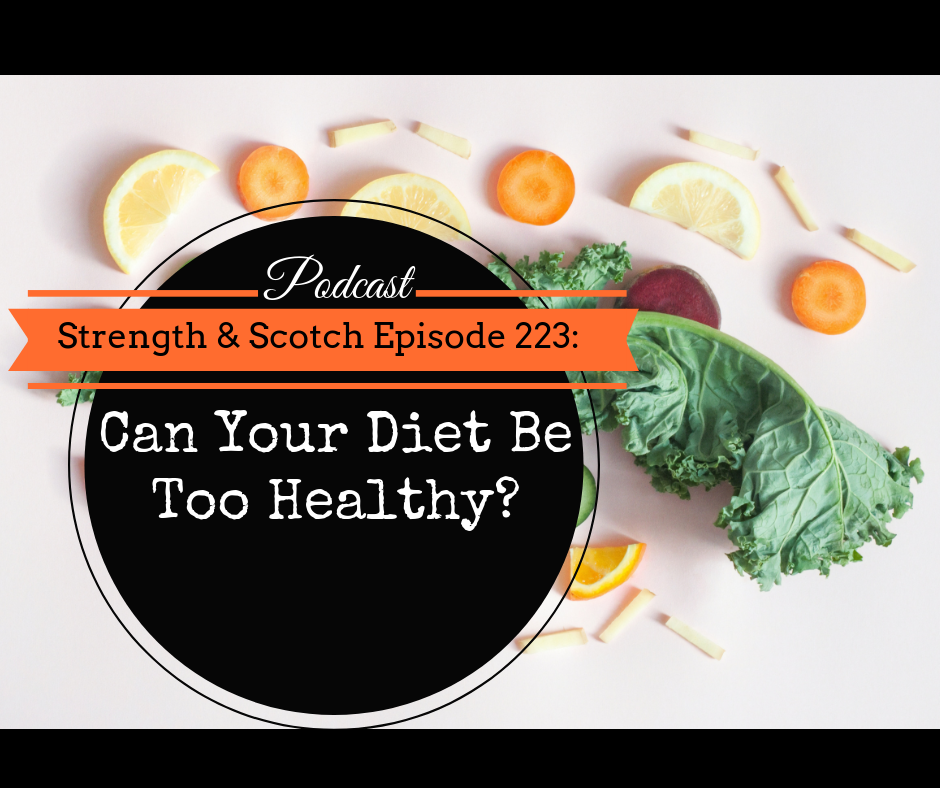Episode 223 Show Notes
Show notes….
Today, Grant and Heavey discuss when healthy eating stops being healthy. This topic has been brought up weeks ago. A listener submitted a question on Instagram around this topic. When and how does healthy eating become disordered eating? How do you prevent this? And, how do you decide when you’ve gone too far?
[05:50] What is Orthorexia Nervosa?
Heavey reads this excerpt from an article saying that “the pursuit for healthy food consumption is considered a laudable habit. This attitude can turn pathological when cognitions and worrying about healthy nutrition lead to such as an accurate food selection that correct diet becomes the most important part of one’s own life leading to important dietary restrictions, stereotype eating, or impairment in important areas of functioning. This behavior is coined Orthorexia Nervosa. It can share common characteristics with Anorexia Nervosa and Bulimia Nervosa.”
[06:40] Do You Have the Symptoms?
The symptoms of orthorexia are prevalent in a lot of those that suffer from Anorexia and Bulimia and symptoms tend to increase after treatment of those conditions. Heavey found one study that showed co-morbidity of 28% with anorexics and bulimics having orthorexia and increased to a rate of 53% for those individuals after treatment for their eating disorder.
This has great parallelism to whether you’re alcoholic or not. You might be an alcoholic just from one glass of wine per night. The same goes for orthorexia. Grant points out that if you eat super healthy and ultra strict and really restrictive by only eating things that conventional diets says are good, that doesn’t mean you’ve got this disorder. If you start to have damaged relationships and stop being friends and argue with people over food, get defensive, or start hiding how you’re eating, that’s some of the signs that maybe you’ve gone too far.
Heavey adds that it tends to begin with the pursuit of healthier eating and then escalates. There are a few common properties. One of them is spending three hours thinking about shopping for or preparing healthy food.
Another is tying self-esteem to dietary adherence. This is when people beat themselves up when they eat something they perceive as bad. They’re really hard on themselves. Along this line, they also feel superior to those with different eating habits. If you’re vegetarian, you might feel superior to other people who are eating meat because you’re different than what others are doing.
One of the last criteria is making eating properly the central focus of your life.
[11:11] Anorexics vs Bulimics vs Orthorexics: Which Could Be You?
The prevalence isn’t well understood. One paper estimated prevalence in the general population around 7%. Another paper found an incidence of 15% among medical professionals. They also found that Orthorexia is most frequently observed in certain populations including athletes, ballet dancers, yoga practitioners, and healthcare professionals.
One of the things Heavey found enlightening about distinguishing anorexia and bulimia from orthorexia is that anorexics and bulimics obsess over the quantities they’re consuming whereas orthorexics obsess over the quality of what they’re consuming.
Heavey suspects that the reason for such prevalence in those groups is that they tend to be more curious about health in general.
[13:27] Orthorexia: Is There Really Such a Thing?
Grant brings up an interesting concept that it doesn’t even exist. He found an article on Medium.com saying Orthorexia is Bullshit. Not saying that orthorexia is bullshit, but the author simply reflects sentiment within some of these restrictive diet groups that the concept of orthorexia is bullshit and that it’s a term coined to create aversion against them and attack them. They’re just doing what they believe is real. There is no such thing as too much healthy eating. People saying it’s not real makes its true diagnosis even harder. We don’t really know the real incidence rate is. In fact, it’s not an official medical diagnosis. There’s not a condition known as orthorexia within the medical sphere. The National Eating Disorders Organization does, in fact, recognize this as a disorder.
[15:38] When Eating Healthy Can Be Self-Damaging
Grant and Heavey had a listener reach out who suffers from Orthorexia. He was previously anorexic so he fits the profile that we’ve been talking about. He fits this exact profile that’s been outlined above. He got injured and put on some weight and then he became obsessed about taking it off. He found himself categorizing food as good or bad based on their micronutrient composition. He was obsessed about hitting the threshold of 100% of each vitamin everyday.
He also shared how he got really anxious. Anytime he gets out of his routine where he doesn’t know all the ingredients in his food, it causes severe anxiety. He said that anxiety can begin many days prior to the event and this could go on for multiple days. He feels guilty around and even using the word “poisoning” his body because of the unknown substances present in his meal. This is totally different than somebody trying to just eat healthy. There is a psychological component to this which is the self-esteem element.
Grant points out that not only nutrition is affected here, but also, stress, which is another pillar of health. Stressing out about food creates emotional damage to yourself, it certainly outweighs whatever benefit it is from healthy eating. Researchers are also investigating how this may be a subset of OCD. Anorexia, bulimia, OCD, and orthorexia share a lot of common traits. One of the keys to improving your health and losing weight is to not surround yourself with bad situations.
[19:27] The Orthorexia Questionnaire
Back in 1997, Dr. Steven Bratman, who coined this term orthorexia, came out with this questionnaire that has since been improved upon. Questions included in the questionnaire include:
Do you spend more than three hours per day thinking about your diet?
Do you plan your meals several days ahead?
Is the nutritional value of the meal more important than the pleasure of eating it?
Has the quality of your life decreased as the quality of your food has increased?
Have you become stricter with yourself lately?
Does your self-esteem get a boost from eating healthy?
Have you given up foods you used to enjoy in order to eat the right food?
Does your diet make it difficult for you to eat out, distancing you from family and friends?
Do you feel guilty when you stray from your diet?
Do you feel at peace with yourself and in total control when you eat healthy?
They say that a yes to four of five of these implies that you should consider relaxing your dietary constraints a little bit. Yes to all of them or nearly all of them implies potentially an obsessive mindset when it comes to food and likely, you should seek out some help.
[22:15] It’s Malnourishment!
Moreover, Heavey found a study that evaluated people with orthorexia and the results showed that those who suffer from it reported significantly more symptoms related to poor physical health than the control groups. These complications were in line with those that accompany extreme dietary restrictions. It’s effectively malnourishment from trying to be as healthy as possible.
Even before Grant knew of this term, Grant knows a person whom he thinks has orthorexia. He fainted one morning and hit their head on the toilet seat. They said they just didn’t have enough protein with them. That’s why they passed out. This is a really sad thing!
Heavey adds that the self-esteem and isolation pieces are big. Those are the red flags in this whole thing.
[24:30] How to Get Help
The best starting point to any of this is to talk to a doctor or licensed therapist especially if you found yourself answering yes to many of those questions. What Heavey does in his practice is to look for warning signs since this is outside the scope of his practice.
Enjoy Your Food
A lot of his steps to address this in his coaching is to help create a mindset around not labeling foods as good or bad, and to accept that all foods are fine and that prioritizing certain foods might help you reach your goal.
But if you want to enjoy food, you should be able to make room for it in your life. Good or bad, or healthy or not healthy is ridiculous if you think about it.
Focus on Inclusion, Not Exclusion
When you’re trying to lose weight, try to focus on increasing vegetable or protein content in their diet and not to focus on the things to not eat. But if you eat a load of vegetables and protein, then you’re not going to be as hungry.
Awareness is Key
Another helpful thing is to be aware of this condition. Also, learn how to better communicate with clients in a way that you’re not conveying this idea of bad foods and ultra restrictive approaches or what a proper diet is. Remove any of that idea from your vocabulary. It’s tough because that’s what people are searching for.
[29:12] When You Know Enough is Enough
Once you get to that 90% point with diet, for the most part, you’ve checked that box of eating well. You’re not going to get much from taking it any further. When we get into these eating disorders, people want to keep pushing and pushing and get to that 100% point of eating “healthy.”
There’s a tendency for people with these disorders not getting help and to only seek help after it’s been identified. But if you do spot some of these tendencies in yourself early on, the sooner the better that you can talk to someone about that. Or at least, talk to someone or anyone because people care!
[33:09] Enjoying a Bottle of Glenlivet
Grant and Heavey are drinking a bottle of 18-year-old Glenlivet. This is the first time Heavey has enjoyed a scotch that’s over 15 years old that is not from Islay. So how’s it like? There’s no peat. It’s one of the less expensive 18-year-olds in the market. They actually cost $80 at Costco. Heavey can’t taste its complexity, but what he’s sure of is that it tastes like there’s oak in his mouth. Nevertheless, both like this. So if you’re not into peats and looking for a special bottle without going crazy, they highly recommend this one!
Links
National Eating Disorders Organization

Check out the gear page for everything Strength & Scotch! You’ll find a listing of all the supplements and other programs we’ve discussed on the show as well as our killer t-shirts!

